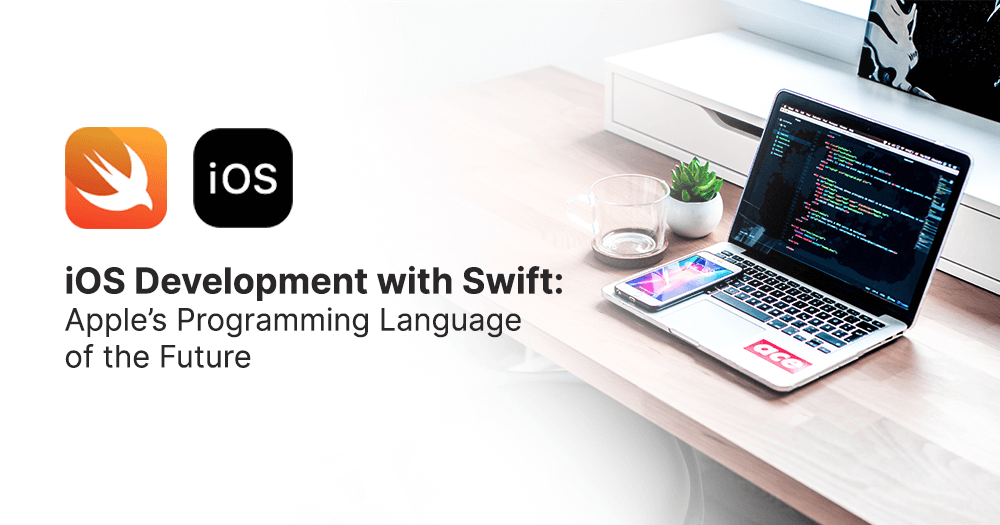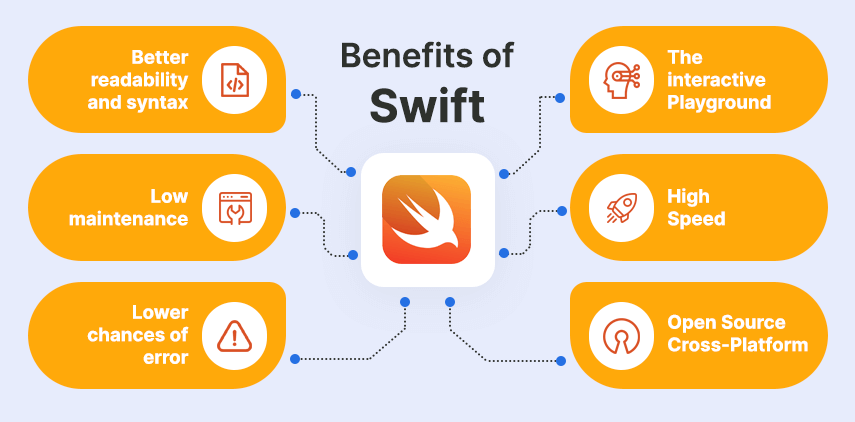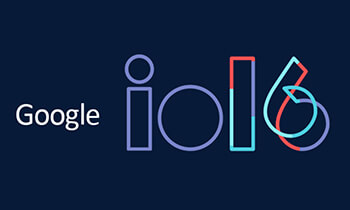The Swift programming language is making huge waves in the world of iOS App development. Its popularity over the prevalent Objective-C can be attributed to the relative ease of avoiding programming errors and additional features like bug detection and higher programming speed.

All about iOS Development with Swift
Apple Inc designed the compiler-based Swift. It was made to develop apps compatible with Apple devices. Swift is quickly being adopted as the industry standard. Built as an alternative, Swift has several benefits over the preceding Objective-C. The standout feature is its open-source nature, allowing it to be used on different non-Apple platforms like Linux.
Global Trends on Swift Programming Language
Apple’s latest programming language venture is firmly cementing its position in terms of popularity among programmers, according to research conducted by StackOverflow in 2018. With 8.1% votes, Swift was the 14th “most popular programming language”.
A significant achievement, considering the fact that it did not exist ten years ago. It had also secured the 6th position as the “most-loved” language among programmers.
If we consider the search analytics data of language tutorials by Google Trends, Swift occupies the 9th rank in the PYPL(Popularity of Programming Language) Index.
Proficient Swift developers also enjoy attractive remuneration for their services, often surpassing the more popular languages (JS, Java, C#, or Python). The demand for Swift language proficiency has skyrocketed in 2020. There are over 6,000 job openings in the USA, and an average annual salary of $125000 as per the recruitment website Indeed. Rankings-wise, it occupies the 2nd position, trailing only behind Ruby.
History
Here is all you need to know about the history of the Swift programming language.
- Swift was created by Chris Lattner and was launched worldwide in June 2014.
- Swift was brought over to the open-source platform in December 2015.
- There have been periodic Swift version updates- Swift 1.0,1.1(2014); 1.2, 2.0, (2015); 3.0 (2016); 4.0 (2017); 4.1 (2018); 5.0, 5.1(2019); 5.2(2020).
- Over six hundred worldwide coders have been tirelessly working- enhancing the scope of Swift.
- The updated Swift 5.3 arrived on September 16, 2020.
- Swift codes were first hosted at Github. Being open-source, anyone can obtain the code. Programmers can also build or contribute back to language development.
- Compatibility with Ubuntu’s Linux has existed since Swift 2.2. The 5.2.4 version saw accessibility with CentOS and Amazon Linux.
- The iPad-only app titled Swift Playgrounds appeared worldwide in 2016. It had a 3-D-video game-like interface. The aim was to teach beginners how to code with Swift.
Use of Swift Programming Language in Popular Apps
Swift has an efficient coding style. With Apple’s significant market share, iOS app development with Swift is trending worldwide. Several major organizations are already using Swift for developing iOS apps and improving their operations. The most widely used ones include Facebook, Whatsapp, LinkedIn, Kickstarter, Airbnb, Uber, Accenture, Khan Academy, Twitter, CNN, Instagram, Truecaller.
The dynamic libraries present in Swift guarantees superior app performance. Quicker loading and lower storage space result in an extremely useful environment for mobile app development. Here are some additional popular apps that incorporated Swift iOS app development:
- WordPress: The iOS version of the WordPress app is open-source in nature. Users can handle their WordPress blogs or websites directly from their iPhone(or any other Apple device). Available functions include creating/editing posts and pages. The user can also view the stats or respond to comments.
- Mozilla Firefox: The iOS version of our beloved explorer was built using the Swift language. It is widely used all over the world. A perfect browser for users who prioritize safety and privacy.
- Wikipedia: The world’s largest online encyclopedia uses Swift. The app version is fully functional. Users can search results through a database consisting of over 40 million articles. There are more or less 300 languages.
Future Scope of Swift Programming Language
77% of US citizens own a smartphone. And the iPhone holds over 50% of the market in the US. Market research and statistics suggest the trend will continue. Billions of smartphone units are manufactured and shipped across borders on an annual scale. A gigantic change in internet usage habits and media-viewing patterns is easy to see. Most people use smartphones nowadays.
The app development sector is a potential treasure cave. For app-owners, it makes sense to generate revenue through in-app advertising. Reports estimate in-app advertisement will continue growing at a staggering CAGR of 19.4% from 2019 to 2025. The valuation has been predicted to rise to $201 billion by 2021. Apple is the second-largest worldwide mobile manufacturer. Thus the sky is practically the limit for Swift developers.
Key features of the language:
- Modern cross-platform language with a lightweight syntax.
- Open-sourced and works both on Apple iOS and Linux.
- Multiple tool integration features.
- Low maintenance, simple and reliable.
- Safe and secure coding environment.
- Playground mode for creative experimentation.
- Super-fast LLVM compiler technology for quicker execution.
- Concise readability.
Why should you pursue iOS development with Swift?
The aim of Swift app development was to remove complexity. Many programmers suggest- Swift’s ease permits usage even by absolute beginners. The primary reasons for its growing popularity include the following:

1 Better readability and syntax
The concise syntax is a huge plus. A compact set of rules, regulations, and framework is a breeze to work with. Swift also has a preference for skipping semicolons at line ends or brackets for conditional statements. Swift Codes are analogous to traditional English texts. This makes coding simpler- saving up a lot of time.
2 Low maintenance
Programmers report higher levels of efficiency in Swift. It merges Objective-C header(.h) with implementation files (.m) to form a single-code file (.swift). Swift is not dependent on other programming databases.
3 Lower chances of error
There is a much lower chance of coding or compiling error. Swift does provide better safety and security. Plus, the feedback loops are also shorter. All of these combine to make Swift the best option for mobile iOS app development. Swift also bestows the users with advanced error tracking options that allow programmers to view the possible errors in their code straight away.
4 The interactive Playground
The innovative Swift Playground allows programmers to check out any coding algorithm without completing the entire app. The inline code execution feature in iOS facilitates the development of a chunk of code, process, and display the feedback in return. This process is known as REPL(Read-Eval-Print-Loop). With data visualization assistance, the Playground feature allows the room to be creative and experiment along the way. It also has the potential to improve potential coding speed. A standout interactive feature indeed.
5 High Speed
In speed, Swift edges out over other programming languages. Absolute coding ease also results in lower developmental costs. For the same program, Swift displays output 3.9 times faster than Python. It is also quicker than Objective-C. The app logic works at a much faster speed and is comparable to C++. The industry veteran is widely lauded for its terrific speed.
6 Open Source Cross-Platform
An open-sourced platform, Swift does not cost a single cent. There are additional open-source perks, including effortless code upgrades. It is possible to track bugs or make an email list. The scope of customization based on your needs is endless. Apple encourages contributions from the programmer community. It also makes periodic updates as per feedback.
Swift Vs Objective C
The constantly-evolving Swift is successfully replacing its predecessor, Objective-C. Several programmers find Objective-C too complicated. Let us take a look at how Swift becomes a clear winner in the comparison.
- Developing an Objective C iPhone app is cumbersome and time-consuming compared to Swift.
- Based on C, Objective C is difficult to learn and understand. In the case of Swift, it’s the exact opposite.
- Objective C has a unique syntax, unlike any other. Swift combines the positive aspects of Python, JS, Ruby, Go, and more.
- The code length of a Swift program is much shorter. It is also more lucid and rational.
- Swift boasts of an interactive app-development environment. Objective C doesn’t have any.
- Swift syntax and construction are more secure.
- There is greater scope for error adjustment in Swift. Objective C does not feature visualization.
- Swift is optimized for Linux OS-usage(and possibly Android in the future). Objective C is reserved only for Apple.
- Though well-developed, Objective C has been missing updates for a long time.
Cons of using Swift Programming Language
Each and every programming language has its merits and demerits. While there are several advantages of the Swift programming language- critics might find a few issues with it. Let us have a go through the cons of the Swift language:
- A newcomer in the world of programming language
It must not be forgotten that Swift is a new programming language. The other standalone option, like Objective-C, has been present since the 1980s. There is still plenty of room for improvement- which thankfully is provided periodically by Apple through each update. Recent updates include ABI stability, backward compatibility, renewed documentation.
- Limited Pool of Skilled Personnel
As expected from a new language- the number of members in the Swift community is still low. StackOverflow Developer Survey states that only 6.6% of its respondents dabble in Swift.
- Non-compatible with previous iOS versions
Swift is compatible only with iOS version 7 and afterward. It is not possible to use Swift for legacy products. However, studies state less than 5% of current Apple devices running on versions preceding the iOS7.

Recent Swift 5 Updates
i Application Binary Interface(ABI) Stability
The final developed app will not require additional app-related files or library download. The majority of these are already components of the Apple device software. ABI stability will result in better development of future apps, along with a smaller size. In simple words, it helps programmers to understand the correspondence between codes that have already gone through the compiler.
ii Library Updates
There have been several standard library feature updates in the Swift 5 from its predecessor, the Swift 4.2. Enhanced Raw Text Support, UTF-8 encoding updates are a few present in Swift 5.
iii Upgraded Package Manager
Featured updates include changes in the dependency mirroring. Library import features through REPL are now possible with just the swift run command.
iv Additional Updates
The Swift 5 also features several improvements in language and compiler updates. It is now possible for the user to exclusively access the memory for debugging or checking the release build. The function responsible is known as Exclusivity Enforcement by default.
Conclusion
We hope that the information provided in the post was helpful. If you need professional iOS app development with Swift for your idea and business? Mobisoft is the option you should be looking for. Our team of experts consists of experienced Swift and Objective C developers, programmers, and coders. Combined with an extensive work profile that features several satisfied clients, we are here to bring the best out of your business venture app with iOS app development. Allow us to serve you for a better tomorrow. Contact us for further queries/estimates.

Author's Bio

Nitin Lahoti is the Co-Founder and Director at Mobisoft Infotech. He has 15 years of experience in Design, Business Development and Startups. His expertise is in Product Ideation, UX/UI design, Startup consulting and mentoring. He prefers business readings and loves traveling.









